Self-assessment with AP Inter 1st Year Sanskrit Model Papers Set 1 allows students to take charge of their own learning.
AP Inter 1st Year Sanskrit Model Paper Set 1 with Solutions
Time : 3 Hours
Max Marks : 100
सूचना : प्रथम, द्वितीय, तृतीयप्रश्नान् अनुवादप्रश्नं च विहाय अन्ये प्रश्नाः संस्कृतभाषायामेव समाधातव्याः ।
I. एकं श्लोकं पूरयित्वा भावं लिखत । (6 × 1 = 6M)
अ) जयन्ति ……………………. भयम् ।।
जवाब:
जयन्ति ते सुकृतिनो रससिद्धाः कवीश्वराः ।
नास्ति तेषां यशः काये जरामरणजे भयम् ||
Victorious are those accomplished and blessed poets, whose bodies of fame do not have the fear of old age or death.
आ) एकः स्वादु ………………… प्रचिन्तयेत् ।।
जवाब:
एकः स्वादु न भुञ्जीत नैकः सुत्पेषु जागृयात् ।
एको न गच्छेदध्वानं नैकश्चार्थान् प्रचिन्तयेत् ॥
One should not eat a sweetmeat alone. One should not be awake while others are asleep. One should not travel alone. One should not decide matters alone.
II. एकं निबन्धप्रश्नं समाधत्त । (6 × 1 = 6M)
अ) दशरथस्य पश्चात्तापः इति पाठस्य सारांशं लिखत ।
जवाब:
Introduction : The lesson दशरथस्य पश्चात्ताप: is an extract from the Ayodhya Kanda of Ramayana, written by Sage Valmiki. Rama went to the forest at the command of Kaikeyi. Dasaratha could not bear separation from Rama. Then he told Kausalya that he was cursed by a sage during his youth.
Dasaratha’s Lamentation :
Dasaratha told Kausalya that one would receive the good or bad fruits of one’s own deeds only. Dasaratha committed a sin during his youth. He was famous for his ability to shoot at sound. He received the fruit of his action just as a boy who had eaten poison out of ignorance.
Going for hunting at night :
Once, when it was rainy season, Dasaratha went to the bank of river Sarayu at night for hunting. There, he heard the sound of a pitcher being filled with water. He mistook it for the sound made by an elephant and released an arrow towards that sound. अचक्षुर्विषये घोषं वारणस्येव नर्दतः ।
The painful human cry :
Then he heard a human voice crying how anyone could hit a hermit, who came to the river to carry water. He grieved for his old parents. It was a cruel stupid, who killed all of them.
Dasaratha rushed to the bank of the river to find a hermit hit by his arrow. His hair was scattered, and the water pitcher fell at a distance. The boy asked the king what harm he did to him. He was about to carry water to his parents. Dasaratha killed his parents also who were weak and blind. He asked Dasaratha to carry the news to his father. पितुस्त्वमेव मे गत्वा शीघ्रमाचक्ष्व राघव ।
The old and blind couple :
Carrying the water pot, Dasaratha went to the hermitage and saw the weak and blind parents of the boy who were without any support, and who looked like birds with clipped wings. The old man thought that it was his son, and asked him to give him some water. Then Dasaratha said that he was not their son, and he was Dasaratha, a Kshatriya. He told them that he went at night to the bank of the river Sarayu to kill any wild animal or an elephant that came to drink water. He mistook the sound of filling a pitcher with water for that of an elephant, and killed it with an arrow. द्विपोऽयमिति मत्वाऽयं बाणेनाभिहतो मया । But he saw their son with the arrow struck in the heart.
The curse uttered by the old man :
On hearing those cruel words, the sage could not control his emotion. He cursed Dasaratha saying that he would die lamenting for his son. एवं त्वं पुत्रशोकेन राजन् कालं करिष्यसि ।
![]()
आ) सर्वभाषाणां जनन्याः संस्कृतवाण्याः प्राशस्त्यं लिखत ।
जवाब:
Introduction: The lesson अमरवाणीप्रशस्तिः is taken from सुरवाणीमणिहारः written by Sri E. Sathakopacharya. The greatness of Sanskrit, the language of the gods is described in a beautiful way in this lesson.
Salutations to Amaravani: The poet salutes to Sanskrit, which is affectionately fondled by Brahma and other gods, praised by Valmiki, Vyasa and other poets, and decorated by Kalidasa and other poets.
The poet says that the speech of the gods has descended to the earth showing compassion on humans, who cannot roam in the heaven or enjoy with the celestial damsels. धरणिममरवाणि प्राप्य नाकीकरोषि ।
He further says that had not the goddess come down thus, men would have fallen in the well of birth and death. Because they would not have known god.
The greatness of Sanskrit: The poet says that Sanskrit is the mother of all languages. भवसि सकलभाषाजन्मदात्री यत्स्तवम् । Other language s shine by their association with Sanskrit just as moon lotuses bloom because of their association with the moon. This language shines with many meanings in every syllable like the ocean with gems. विराजसे अनल्परन्नाद्याश्रयः सागरो यथा | Even if some people criticize her, it does not diminish her greatness. Bursting meteors do not dry up the ocean.
It the greatness of Sanskrit that even after ages passed, one still remembers Valmiki, Vyasa and Kalidasa.
None equals the goddess of speech: Men may make rockets, travel in space reaching the moon or go to the heaven with human bodies, still they pray for the grace of the mother of speech. She subdues the suffering of birth by teaching brahmavidya, delights with the poems of Kalidasa etc. and leads to the path of prosperity by preaching dharma. There is none equal to her. त्वत्समा कास्ति मान्या । There may be many languages in the world. But they are of no use. A river which quenches the thirst of the traveller in summer is the best.
The poet asks man that what happens to him if the bombs he is making explode. If one wants to follow the panchasheel of Nehru, then one should resort to Sanskrit that develops the spiritual knowledge.
III. एकं निबन्धप्रश्नं समाधत्त । (6 × 1 = 6M)
अ) पुण्डरीकमुद्दिश्य कपिञ्जलः किम् उपदिदेश ।
जवाब:
Introduction : The lesson Kapinjalopadesa is an extract from the Kadambari, written by Bana. Pundarika, an ascetic fell in love with a celestial nymph Mahaswetha, His friend Kapinjala advised him that it was not proper for him to lose his selfcontrol. He asked him to condemn the Love-god.
Kapinjala’s questions :
Kapinjala told Pundarika that it was not proper for Pundarika to behave in such a way as the common men would behave. The ascetics had the wealth of courage. धैर्यधना हि साधवः । He asked Pundarika why he did not restrain himself. How he was attacked by the senses. Where had his courage, self-restraint, calmness, celibacy, learning, disinterestedness and distaste for pleasures gone? If people like him were also sullied by passion then there was no use of intellect, study of the scriptures, culture, knowledge received from the teachers, and awakening. निरर्थक: संस्कारः।
He asked him how did he not notice the crystal rosary that fell from his hand and taken away by that evil woman. He exclaimed that Pundarika was absent minded, and thought of rescuing him before his heart was stolen by that evil woman. अहो विगत चेतनत्वम् ।
When Pundarika accepted that he was attracted by the beauty of Mahaswetha, Kapinjala further advised thus.
Kapinjala’s advice :
He asked Pundarika whether it was taught by his teachers of he studied it in the scriptures. Was it a means to acquire Dharma, a new kind of penance, a mystic vow or path leading to heavens? Could he even imagine this, let alone tell or see ? Why did he allow the Cupid make him a laughing-stock ? Only fools are tormented by the Cupid मूढो हि मदनेन आयास्यते Could he have happiness in something condemned by the virtuous and honoured only by the vile ?
He said that he was a fool, who watered a garden of poisonous plants, embraced a sword creeper, held a black serpent or touched a burning coal thinking them to be something else. If he could not restrain his senses or control his mind, what was the use of his knowledge like that of the light of a firefly ? And he advised him to condemn the stupid Love-god.
आ) स्वेदस्य पुष्पाणि इति पाठ्यभाग सारांशं लिखत ।
जवाब:
The Teacher’s Query:
Once a teacher, while going to the forest along with his students asked them which water was the best in the world. The students gave different answers such as the water of the Gangas, rain water and tears. The teacher then told them a story.
Sabari’s Hospitality :
While searching for Sita in the forest, Rama and Lakshmana met Sabari. She worshipped Rama, and offered him sweet fruits. There were beautiful and fra- grant flowers in front of the place where Sabari lived. Rama asked her about those flowers.
Matanga and his students:
Sabari told him that the hermitage of Matanga used to be there at that place. Many students came for their studies to the hermitage. Once it was the end of the summer, and monsoon was about to set in. But no arrangement to store fuel sticks was made.
Sage Matanga and his students went to the forest, and cut wood. The young and the old carried the load on their heads and returned to the hermitage. Every- one was drenched in sweat. Beads of sweat dropped from the bodies on the ground.
The fragrance :
The next day everyone at the hermitage was surprised at the fragrance that spread there. The students found that the fragrance came from the direction of the forest where they went the day before. They went there and saw beautiful flowers blossomed here and there. Those flowers were not there the day before. The students ran back to Matanga, and reported to the teacher that strange inci- dent. Matanga went there, and touched those flowers affectionately.
The flowers of sweat :
Matanga told his students that the flowers were born from their sweat. Sweat born of labour was pure. The heart of Mother Earth seemed to have bloomed up on seeing their effort. He told them that there was nothing purer than physical labour. If the farmer and the weaver did not work, there would be no crop or clothes. The world moved on because of the labourers. He advised them to respect the workers. The students promised Matanga that they would respect the labourers and see that they were comfortable.
Rama and Lakshmana bowed to those flowers and went away.
The real sweat :
Having told the story the teacher explained to his students that the sweat from which any useful thing was produced was the sacred and true sweat. He advised his students to make the lives of the workers happy when they grew up.
![]()
IV. चतुर्णां प्रश्नानां समाधानानि लिखत । (4 × 2 = 8M)
अ) अर्थशास्त्रे कति अधिकरणानि सन्ति ?
जवाब:
अर्थशास्त्रे पञ्चदश अधिकणानि सन्ति । तेषु 150 अध्यायाः सन्ति ।
आ) राजसान्नवाच्याः के भवन्ति ?
जवाब:
अतिकषायपदार्थः, अतिलवणम्, अत्युष्णापदार्थः अतिक्षारपदार्थः, अत्याम्लपदार्थः, अतिक्षातिदाहपदठार्थाः राजसान्नवाच्या भवन्ति ।
इ) सर्वे छात्राः बोपदेवं किमिति कथयन्ति स्म ?
जवाब:
सर्वे छात्राः बोपदेवं मूर्खशिखामणि इति कथयन्ति स्म ।
ई) कृपणस्य अग्रे गमनं दृष्ट्वा सर्वे किं कृतवन्तः ?
जवाब:
कृपणस्य अग्रे गमनं दृष्ट्वा सर्वे अट्टहासं कृतवन्तः ।
उ) नागार्जुनः कः ?
जवाब:
नागार्जुनः रसायनशास्त्रज्ञः प्रसिद्धः चिकित्सकः च ।
ऊ) पेटिकायां व्यापारी किम् अपश्यत् ?
जवाब:
पेटिकायां व्यापारी एवं जीर्णं धौतवस्त्रम् एकं प्राचीनं करांशुकम् एकं पुरातनं पादत्राणम् च अपश्यत् ।
V. द्वयोः संदर्भ व्याख्यानं लिखत | (2 × 3 = 6 M)
अ) पितुस्त्वमेव मे गत्वा शीघ्रमाचक्ष्व राघव ।
जवाब:
परिचयः – एतत् वाक्यं दशरथस्य पश्चात्तापः इति पाठ्यभागात् स्वीकृतम् । अयं पाठ्यभागः वाल्मीकिरामायणे अयोध्याकाण्डतः स्वीकृतः ।
सन्दर्भः – तापसकुमारः दशरथम् एवम् उक्तवान् ।
भावः – राजन्, भवान् एव शीघ्रं गत्वा मम पितरम् एनम् वृत्तान्तम् वदतु ।
विवरणम् – मृगयार्थं गतः दशरथः गजः इति मत्वा रात्रौ बाणेन तापसं हतवान् । नदीतीरे पतितः तापसः दशरथम् उवाच यत् भवान् मम पितरं मम मरणवार्ता वदतु इति ।
आ) न रत्नमन्विष्यति मृग्यते हि तत् ।
जवाब:
परिचयः – एतत् वाक्यं मायावटुः इति पाठ्यभागात् स्वीकृतम् । एषः भागः कालिदासस्य कुमारसम्भवे पञ्चमसर्गात् स्वीकृतः ।
सन्दर्भः – मायावटुः पार्वतीम् एवं वदति ।
भावः – रत्नं अन्वेषणं न करोति । तत् अन्विष्यते ।
विवरणम् : – पार्वत्याः तपोवनं एकः जटिलः प्रविवेश । सः अवदत् यत् यदि पार्वती पतिमिच्छति तपसा अलम् । रत्नं न अन्विष्यति । तत् अन्वेष्यते ।
इ) जगति विबुधवाणि ! त्वत्समा कास्ति मान्या |
जवाब:
परिचयः – एतत् वाक्यं अमरवाणीप्रशस्तिः इति पाठ्यभागात् स्वीकृतम् । अस्य कविः श्रीमान् ई. शठकोपाचार्यः ।
सन्दर्भः – कविः अमरवाणीं प्रशंसन् एवं वदति ।
भावः – जगति संस्कृतभाषासमा अन्या भाषा नास्ति ।
विवरणम् – संस्कृतभाषा भवतापं शमयति, आनन्दं जनयति तथा शुभगार्गं दर्शयति । संस्कृतसमा अन्या भाषा नास्ति ।
ई) उपोष्य धर्मं प्रथमं कुरुध्वम् ।
जवाब:
परिचयः एतत् वाक्यं कपीनामुपवासः इति पाठ्यभागात् स्वीकृतम् । अस्य कविः श्रीशैलं ताताचार्यः ।
सन्दर्भः – कपिसार्वभौमः अन्यान् कपीन् एवं वदति ।
भावः उपवासं कृत्वा धर्मम् आचरन्तु |
विवरणम् – कपिसार्वभौमः वदति यत् कपयः क्लेशं सहित्वा एकादश्याम् उपवासं कृत्वा धर्मम् आचरन्तु इति ।
VI. द्वयोः संदर्भ व्याख्यानं लिखत | (2 × 3 = 6 M)
अ) धैर्यधना हि साधवः |
जवाब:
परिचयः एतत् वाक्यम् ‘कपिञ्जलोपदशः इति पाठ्यभागात् स्वीकृतम् । अस्य मूलग्रन्थः कादम्बरी | अस्य कविः बाणः ।
सन्दर्भः महाश्वेतायाम् अनुरक्तम् पुण्डरीकम् सन्मार्गे प्रवर्तयितुं कपिञ्जलः एवम् उपदिशति ।
अर्थः – साधुजनानां तु धैर्यम् एव धनम् ।
विवरणम् – कपिञ्जलः पुण्डरीकं वदति यत् पुण्डरीकस्य स्थितिः तस्य अनुरूपा न । साधुजनानां धैर्यमेव धनम् । परन्तु पुण्डरीकः विक्लीभवति स्म ।
आ) ईश्वरे च दरिद्रे च मृत्योः सर्वत्र तुल्यता ।
जवाब:
परिचयः – एतत् वाक्यं भोजस्य औदार्यम् इति पाठ्यभागात् स्वीकृतम् । अस्य कविः बल्लालः ।
सन्दर्भः – गोविन्दः भोजम् एवम् अवदत् ।
भावः – मृत्युः धनिकदरिद्रभेदं न गणयति ।
विवरणम् – गोविन्दः भोजम् अवदत् यत् पण्डिते, मूर्खे, बलवति, अबले, धनिके, दरिद्रे च मृत्युः समानः एव ।
इ) न हि परिश्रमात् ऋते पवित्रम् इह किमपि विद्यते ।
जवाब:
परिचयः – एतत् वाक्यं स्वेदस्य पुष्पाणि इति पाठ्यभागात् स्वीकृतम् । अस्य रचयित्री डा. माधवी जोषी ।
सन्दर्भः – मातङ्गः छात्रान् एवम् उपदिष्टवान् ।
भावः – परिश्रमं विना अन्यत् पवित्रम् नास्ति ।
विवरणम् – श्रमजातः स्वेदः पवित्रः इति मातङ्गः उपदिष्टवान् । परिश्रमः एव पवित्रः । श्रमस्य स्वेदः न भवति चेत् जगत् न प्रचलति । इति उक्तवान् ।
ई) जीर्णम् अड़गे सुभाषितम् ।
जवाब:
परिचयः – एतत् वाक्यम् वर्षापरिदेवनम्इति पाठ्यभागात् स्वीकृतम् । अस्य रचयिता आचार्य गुल्लपल्लि श्रीरामकृष्णमूर्तिः ।
सन्दर्भः – स्वच्छतापरिरक्षणार्थं चिन्तयन्ती वर्षादेवी एतत् वदति ।
भावः – सुभाषितम् मनसि एव स्थापितम् ।
विवरणम् – वर्षादेवी स्वच्छतापरिरक्षणार्थं जनान् बोधयितुम् इष्टवती । परन्तु कः श्रृणोति माम् इति सुभाषितम् अङ्गे जीर्णम् ।
![]()
VII. त्रयाणां प्रश्नानां समाधानानि लिखत । (3 × 2 = 6M)
अ) सरयूनदीतीरे दशरथः कम् अपश्यत् ?
जवाब:
सरयूनदीतीरे दशरथः इषुणा हतं तापसम् अपश्यत् ।
आ) पार्वत्याः तपोवनं कीदृशः वटुः विवेश ?
जवाब:
अजिनाषाढधरः प्रगल्भवाक् ब्रह्ममयेन तेजसा ज्वलन् शरीरबद्धः प्रथमाश्रमः यथा कश्चित् वटुः पार्वत्याः तपोवनं विवेश |
इ) दुरात्मनां सहजलक्षणानि कानि ?
जवाब:
दुरात्मनां सहजलक्षणानि – अकरुणत्वम्, अकारणविग्रहः, परधने परयोषिति च कांक्षा, सुजनबन्धुजनेषु असहिष्णुता
ई) चञ्चलाः मकाराः कति ? ते च के ?
जवाब:
चञ्चलाः मकाराः दश । ते मनः, मधुकरः, मेघः, मानिनी, मदनः, मरुत्, मा, मदः, मर्कटः तथा मत्स्यः ।
उ) कालेऽतीतेऽपि कान् स्मरामः ?
जवाब:
काले अतीते अपि व्यासवाल्मीकि कालिदासादीन स्मराम |
ऊ) कपीनां लौल्यं कथं जातम् ?
जवाब:
सशब्दं पतितानि रसवन्ति फलानि दृष्ट्वा कपीनां लौल्यं जातम् ।
VIII. त्रयाणां प्रश्नानां समाधानानि लिखत । (3 × 2 = 6M)
अ) कपिञ्जलः कस्मिन् संदर्भे पुण्डरीकं प्रति उपदेशवचनानि अवदत् ?
जवाब:
पुण्डरीकः महाश्वेतायाम् अनुरक्तः अभवत् । तपोजपादिनियमेषु अनासक्तः च अभवत् । तस्मिन् सन्दर्भे तं सन्मार्गे प्रवर्तयितुम् कपिञ्जलः उपदेशवचनानि अवदत् ।
आ) धनिनां धनं किम् ?
जवाब:
यत् ददाति यत् अश्नाति तदेव धनिनां धनम् ।
इ) पञ्चतन्त्रे कति भागाः सन्ति, ते के ?
जवाब:
पञ्चतन्त्रे पञ्च तन्त्राणि सन्ति । मित्रभेदः, मित्रसंप्राप्तिः, काकोलुकीयम्, लब्धप्रणाशः तथा अपरीक्षितकारकम् इति ।
ई) शिक्षकः छात्रान् किं प्रश्नं पृष्टवान् ?
जवाब:
अस्मिन् जगति किं जलम् अतीव उत्तमम् ? अतीव पूतं जलं किम् ? किंच जलं मूल्यवत् ? इति शिक्षकः छात्रान् प्रश्नं पृष्टवान् ।
उ) व्यासाश्रमद्वारा प्रकटिताः ग्रन्थाः के ?
जवाब:
व्यासाश्रमद्वारा प्रकटिताः ग्रन्थाः योगवासिष्ठम्, शङ्करविजयः, पातञ्जल योगदर्शनम्, विवेकचूडामणिः, अष्टावक्रगीता, बृहदारण्यकोपनिषद्, छान्दोग्योपनिषद् इत्यादयः ।
ऊ) वर्षादेव्याः संदेशः कः ?
जवाब:
सर्वे वयं जागृयाम | स्वच्छतायै प्रयतामहे । यः क्रियावान् स पण्डितः ।
IX. पुस्तकप्रेषणविषये पत्रं लिखत । (1 × 5 = 5M)
जवाब:
कडप
दिनाङ्कः 20-01-2018
सविधे –
मान्यसञ्चालकाः,
सरस्वतीविद्याप्रकाशन्,
विजयवाटिकॉ
मान्याः !
भवद्भिः प्रकाशितेषु अधोनिर्दिष्टानि पुस्तकानि मया यथानिर्दिष्टम् अपेक्ष्यन्ते ।
| क्र.सं | पुस्तकनाम | कविः | प्रतय: |
| 1 | कुमारसम्भवम् | कालिदासः | 5 |
| 2 | श्रीमद्रामायणम् | वाल्मीकिः | 4 |
| 3 | पञ्चतन्त्रम् | विष्णुशर्मा | 6 |
| 4 | भर्तृहरिसुभाषितानि | भर्तृहरिः | 3 |
कृपया एतानि पुस्तकानि वि.पि. पि. द्वारा अधोसूचितं सङ्केतं प्रति प्रेषयन्तु ।
सधन्यवादम् ।
भवदीयः । भवदीया
नाम : ……………..
गृहसंख्या 2-11-18
गान्धीरोड्, कडप |
(अथवा)
ज्वरार्तस्य विरामग्रहणाय अभ्यर्थनपत्रम् लिखित ।
जवाब:
राजमहेन्द्रवरम्
दिनाङ्कः 03-12-2018
सविधे –
प्रधानाध्यापकः / प्रांशुपालः
प्रभुत्व (जूनियर्) उच्चमाध्यमिक कलाशाला,
राजमहेन्द्रवरम् |
मान्याः !
विषयः – विरामस्य कृते अभ्यर्थनम् ।
अहम् अस्मिन् कलाशालायां प्रथमसंवत्सरं पठामि । मम स्वास्थ्यं सम्यक् नास्ति । अहं ज्वरेण पीडितो भवामि | अतः विश्रान्तिं स्वीकर्तुं मह्यं दिनत्रयं 10-22-2018 तः 12-12-2018 पर्यन्तं विरामं यच्छन्तु इति सादरप्रणामपूर्वकं विज्ञापयामि । मम अनुपस्थितिसमये पाठ्यमानान् पाठान् मित्रसकाशात् ज्ञात्वा अहं पठिष्यामि ।
सधन्यवादम् ।
भवतां विधेयः छात्रः
नाम : …………….
अनुक्रमसंख्या
राजमहेन्द्रवरम् ।
X. द्वयोः शब्दयोः सविभक्तिकरूपाणि लिखत । (2 × 6 = 12M)
प्रभुत्व (जूनियर्) उच्चमाध्यमिक कलाशाला,
अ) राम
जवाब:
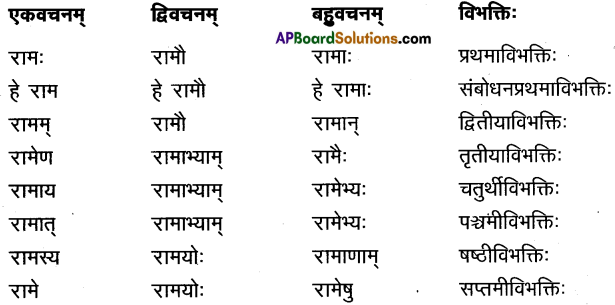
आ) लता
जवाब:
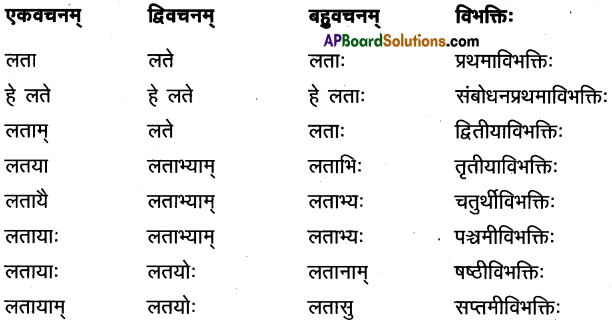
इ) वारि
जवाब:
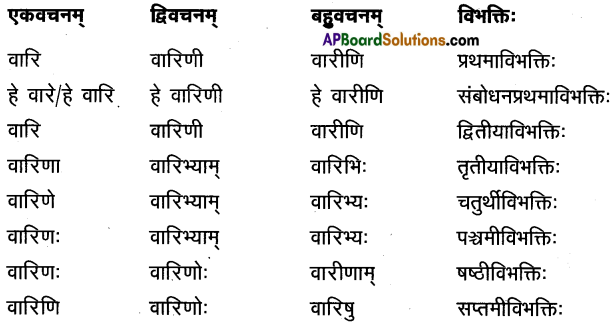
ई) युष्मद्
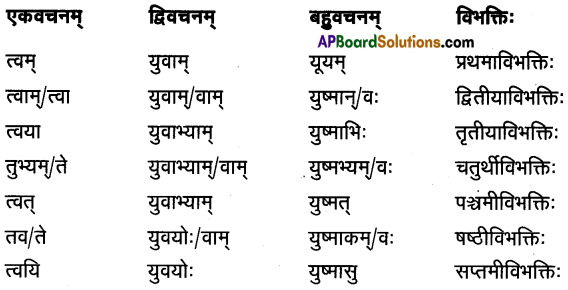
![]()
XI. द्वयोः धातुरूपाणि लिखत । (2 × 3 = 6M)
अ) अभवत्
जवाब:

आ) पठति
जवाब:
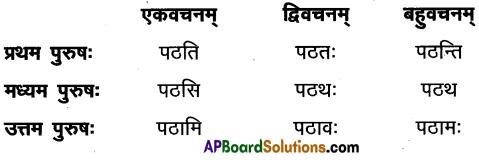
इ) अभाषत
जवाब:

ई) लभते
जवाब:
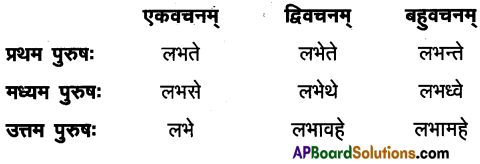
XII. त्रीणि सन्धिनामनिर्देशपूर्वकं विघटयत । (3 × 2 = 6M)
अ) रामालयः
जवाब:
राम + आलय: = सवर्णदीर्घ सन्धिः
आ) देवेन्द्रः
जवाब:
देव + इन्द्र = गुण सन्धिः
इ) एकैकः
जवाब:
एक + एकः = वृद्धि सन्धिः
ई) प्रत्युपकारः
जवाब:
प्रति + उपकारः = यणादेश सन्धिः
उ) गायकः
जवाब:
गै + अक: = अयवायाव सन्धिः
ऊ) कोऽपि
जवाब:
कः + अपि = पूर्वरुप सन्धिः
XIII. त्रीणि सन्धिनामनिर्देशपूर्वकं सन्धत्त । (3 × 2 = 6M)
अ) वाणी + ईशः
जवाब:
वाणीश: = सवर्णदीर्घ सन्धिः
आ) नव + उदयः
जवाब:
नवोदयः = गुण सन्धिः
इ) दिव्य + औषधम्
जवाब:
दिव्यौषधम = वृद्धि सन्धिः
ई) इति + अत्र
जवाब:
इत्युवाच् = यणादेश सन्धिः
उ) हरे + ए
जवाब:
हरये = अयवायाव सन्धिः
ऊ) वृक्षे + अपि
जवाब:
वृक्षेऽपि = पूर्वरुप सन्धिः
XIV. आन्ध्रभाषायां वा आङ्ग्लभाषायां वा अनुवदत । (5 × 1 = 5M)
अ) सः देवं नमति ।
जवाब:
He bows to god.
आ) सीता अन्नम् अखादत् ।
जवाब:
She drank milk.
इ) ते पाठं पठिष्यन्ति ।
जवाब:
They read the lesson.
![]()
ई) सर्वे गुणाः काञ्चनमाश्रयन्ते ।
जवाब:
All the virtues depend on gold.
उ) यत्ने कृते यदि न सिध्यति कोऽत्र दोषः ।
जवाब:
What is wrong if an attempt is made but result is not gained?
XV. एकेन पदेन समाधत्त । (5 × 1 = 5M)
अ) अयोध्यानगरस्य राजा कः ?
जवाब:
दशरथः ।
आ) ‘मायावटुः’ इति पाठ्यभागः कस्मात् स्वीकृतः ?
जवाब:
कुमारसम्भावात् ।
इ) महतां चित्तं सम्पत्सु कथं भवेत् ?
जवाब:
उत्पलकोमलं ।
ई) कुलपावनः कः ?
जवाब:
पुत्रः ।
उ) नेहूबोधितः सिद्धान्तः कः ?
जवाब:
पञ्चशीलः ।
XVI. एकेन पदेन समाधत्त । (5 × 1 = 5M)
अ) महाश्वेता का ?
जवाब:
एका गन्धर्वकन्या |
आ) भोजस्य मुख्यामात्यः कः ?
जवाब:
बुद्धिसागरः ।
इ) पञ्चतन्त्रं केन विरचितम् ?
जवाब:
विष्णुशर्मणा ।
ई) स्वेदबिन्दवः कुत्र पतन्ति स्म ?
जवाब:
भूमौ ।
उ) मलयालस्वामिनः जननीजनको कौ ?
जवाब:
नोट्टियम्माकरियप्पौ ।